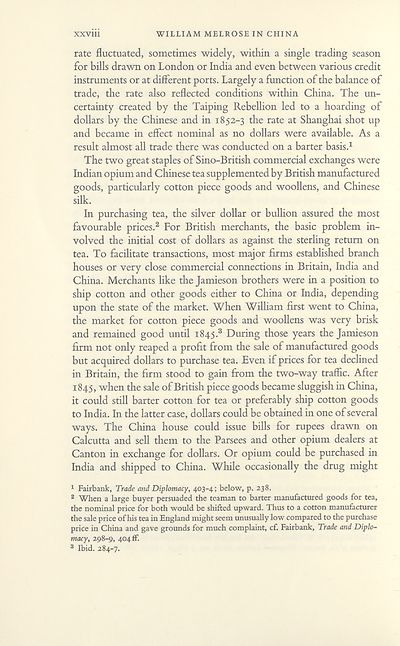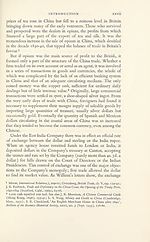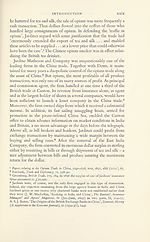Series 4 > William Melrose in China, 1845-1855
(33) Page xxviii
Download files
Complete book:
Individual page:
Thumbnail gallery: Grid view | List view

xxviii WILLIAM MELROSE IN CHINA
rate fluctuated, sometimes widely, within a single trading season
for bills drawn on London or India and even between various credit
instruments or at different ports. Largely a function of the balance of
trade, the rate also reflected conditions within China. The un¬
certainty created by the Taiping Rebellion led to a hoarding of
dollars by the Chinese and in 1852-3 the rate at Shanghai shot up
and became in effect nominal as no dollars were available. As a
result almost all trade there was conducted on a barter basis.1
The two great staples of Sino-British commercial exchanges were
Indian opium and Chinese tea supplemented by British manufactured
goods, particularly cotton piece goods and woollens, and Chinese
silk.
In purchasing tea, the silver dollar or bullion assured the most
favourable prices.2 For British merchants, the basic problem in¬
volved the initial cost of dollars as against the sterling return on
tea. To facilitate transactions, most major firms established branch
houses or very close commercial connections in Britain, India and
China. Merchants like the Jamieson brothers were in a position to
ship cotton and other goods either to China or India, depending
upon the state of the market. When William first went to China,
the market for cotton piece goods and woollens was very brisk
and remained good until 1845.3 During those years the Jamieson
firm not only reaped a profit from the sale of manufactured goods
but acquired dollars to purchase tea. Even if prices for tea declined
in Britain, the firm stood to gain from the two-way traffic. After
1845, when the sale of British piece goods became sluggish in China,
it could still barter cotton for tea or preferably ship cotton goods
to India. In the latter case, dollars could be obtained in one of several
ways. The China house could issue bills for rupees drawn on
Calcutta and sell them to the Parsees and other opium dealers at
Canton in exchange for dollars. Or opium could be purchased in
India and shipped to China. While occasionally the drug might
1 Fairbank, Trade and Diplomacy, 403-4; below, p. 238.
2 When a large buyer persuaded the teaman to barter manufactured goods for tea,
the nominal price for both would be shifted upward. Thus to a cotton manufacturer
the sale price of his tea in England might seem unusually low compared to the purchase
price in China and gave grounds for much complaint, cf. Fairbank, Trade and Diplo¬
macy, 298-9, 404 ff.
8 Ibid. 284-7.
rate fluctuated, sometimes widely, within a single trading season
for bills drawn on London or India and even between various credit
instruments or at different ports. Largely a function of the balance of
trade, the rate also reflected conditions within China. The un¬
certainty created by the Taiping Rebellion led to a hoarding of
dollars by the Chinese and in 1852-3 the rate at Shanghai shot up
and became in effect nominal as no dollars were available. As a
result almost all trade there was conducted on a barter basis.1
The two great staples of Sino-British commercial exchanges were
Indian opium and Chinese tea supplemented by British manufactured
goods, particularly cotton piece goods and woollens, and Chinese
silk.
In purchasing tea, the silver dollar or bullion assured the most
favourable prices.2 For British merchants, the basic problem in¬
volved the initial cost of dollars as against the sterling return on
tea. To facilitate transactions, most major firms established branch
houses or very close commercial connections in Britain, India and
China. Merchants like the Jamieson brothers were in a position to
ship cotton and other goods either to China or India, depending
upon the state of the market. When William first went to China,
the market for cotton piece goods and woollens was very brisk
and remained good until 1845.3 During those years the Jamieson
firm not only reaped a profit from the sale of manufactured goods
but acquired dollars to purchase tea. Even if prices for tea declined
in Britain, the firm stood to gain from the two-way traffic. After
1845, when the sale of British piece goods became sluggish in China,
it could still barter cotton for tea or preferably ship cotton goods
to India. In the latter case, dollars could be obtained in one of several
ways. The China house could issue bills for rupees drawn on
Calcutta and sell them to the Parsees and other opium dealers at
Canton in exchange for dollars. Or opium could be purchased in
India and shipped to China. While occasionally the drug might
1 Fairbank, Trade and Diplomacy, 403-4; below, p. 238.
2 When a large buyer persuaded the teaman to barter manufactured goods for tea,
the nominal price for both would be shifted upward. Thus to a cotton manufacturer
the sale price of his tea in England might seem unusually low compared to the purchase
price in China and gave grounds for much complaint, cf. Fairbank, Trade and Diplo¬
macy, 298-9, 404 ff.
8 Ibid. 284-7.
Set display mode to:
![]() Universal Viewer |
Universal Viewer | ![]() Mirador |
Large image | Transcription
Mirador |
Large image | Transcription
Images and transcriptions on this page, including medium image downloads, may be used under the Creative Commons Attribution 4.0 International Licence unless otherwise stated. ![]()
| Scottish History Society volumes > Series 4 > William Melrose in China, 1845-1855 > (33) Page xxviii |
|---|
| Permanent URL | https://digital.nls.uk/127694973 |
|---|
| Description | Over 180 volumes, published by the Scottish History Society, containing original sources on Scotland's history and people. With a wide range of subjects, the books collectively cover all periods from the 12th to 20th centuries, and reflect changing trends in Scottish history. Sources are accompanied by scholarly interpretation, references and bibliographies. Volumes are usually published annually, and more digitised volumes will be added as they become available. |
|---|


